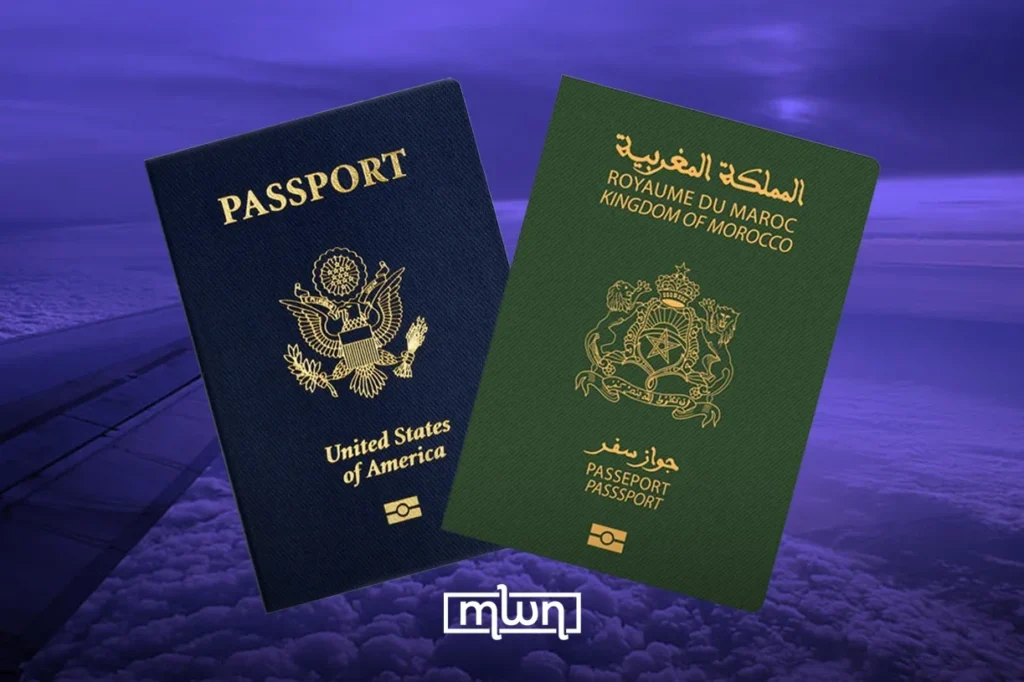The move to Morocco from the United States opens the door to a rich cultural experience in which old traditions correspond to modern life. This North African nation offers a unique mix of Arabic, Berber and French influences as well as a growing expat community and relatively affordable living costs. While the transition is associated with its challenges, from the navigation of bureaucracy to adapting to new cultural norms, the right preparation can help you to successfully make this exciting step.
This guide offers important information with which you can plan and execute your move to Morocco. Regardless of whether you move for work, retirement or adventure, we will treat the most important aspects you have to take into account from practical matters such as documentation and living space to cultural adaptation and daily life.
Essential documentation
First entry requirements
As a US citizen, you can enter Morocco for up to 90 days without getting a visa in advance. Your passport must be valid for at least six months through your planned stay and you should have at least two empty pages for entrance brands. While tourist visa are not necessary for short stays, you have to complete an input card on arrival, which you should keep with your passport throughout your stay.
Allowed to live (residence permit)
In order to stay beyond 90 days, you must receive a residence permit known as Carte de Séjour. The application process should begin within the first month of arrival. You have to visit the local police station in your district with your documentation. The required materials include your passport, several photos in the passage size, the proof of financial resources (bank statements or employment contract), proof of accommodation (rental agreement or ownership certificate) and a clean criminal register check from the United States.
Employment permit
If you want to work in Morocco, you need additional documents. Your potential employer must obtain a work permit from the Ministry of Employment and professional integration. This should be ordered before your arrival and requires the proof of your qualifications, a signed employment contract and the documentation why the position could not be filled by a local candidate.
Documentary
All official US documents, including birth certificates, marriage certificates and academic registration information, must be authenticated. This requires a multi-stage process: first received an apostille from the US State Department and then translated by a certified translator in Morocco in Arabic or French. Keep both original and translated copies of all important documents.
Registration requirements
Within your first weeks in Morocco, you should register with the US message in Rabat via the Smart Traveler registration program (step). This ensures that you receive important security updates and make it easier for the message to contact you in emergencies. You must also be in your place of residence as part of Carte de Séjour’s application process.
Living space and location
Large cities overview
Casablanca acts as Morocco’s business center and offers the most employment opportunities and modern amenities, albeit at higher living costs. Rabat, the capital, offers a quieter atmosphere with excellent infrastructure and a significant diplomatic presence. Marrakech attracts many expats with its lively cultural and tourism industry, while Tangier offers a unique mix of European and Moroccan influence. Consider FEZ or Meknes for an authentic Moroccan experience, although these cities may make more language and cultural adaptation challenges.
Neighborhood selection
Most expats initially settled in modern parts of the city as “Ville Nouvelles” or in areas with established international communities. In Casablanca, neighborhoods such as Gauthier, Racine and ANFA offer amenities and living space in a western style. Rabat’s districts of Agdal and Hassan are popular with diplomats and professionals. Explore the proximity to your workplace, your international schools and your essential services when choosing a location. Modern developments often offer a better infrastructure, but at higher costs than conventional districts.
Rental process
The Moroccan rental market works differently than the US system. Most properties are rented via word of mouth or local real estate agents (Simsar). Long -term rentals usually require a one -year obligation with a three -month rent as a deposit. Leasing agreements should be notarized notarized, and it is advisable to have a local friend or a colleague for checking contracts. The monthly rent in high areas is between 5,000 and 12,000 MAD ($ 500-1,200) for a modern apartment with two bedrooms, while traditional districts offer cheaper options.
Setting up your house
The supply companies must be transferred or initialized under their name, so that their residential license and address require evidence. Electricity (provided by one) and water services can require considerable deposits. Internet services are widespread in urban areas, with important providers such as Maroc Telecom, Orange and Inwi. Document the condition and existence of all articles for furnished properties before signing the rental agreement. Consider stop a specialist to check electrical and sanitary systems because the building standards can deviate from the US expectations. Have Professional Morocco International Moving Companies If you move internationally, you can also accelerate the process and remove non -required loads.
Cultural considerations
The apartment in Morocco often reflects local cultural standards. Traditional houses (Riads) in the medina offer authentic experiences, but may require adaptation to western lifestyle in terms of amenities. Modern apartments are often equipped with amenities in the western style, but can still contain local elements such as bidets and satellite television for local channels. Some buildings have prayer rooms or common rooms that reflect local customs. If you understand and respect these cultural aspects, you can better integrate into your new community.
Frequent challenges
The move to Morocco is inevitably connected to adaptation periods and obstacles with which most expats are confronted during their transition. The language barrier is the first important challenge, since daily life requires a mixture of Darija (Moroccan Arabic) and French, with English limited outside of tourist areas. In the meantime, Moroccan bureaucracy works a significantly different pace than the Americans, since processes such as obtaining a Carte de Séjour often take weeks or months and no more days.
The cultural adaptation extends beyond language beyond the rhythm of everyday life, from the business hours of prayer period to different social norms and gender dynamics. Infrastructure and health care also require a prior planning of private clinics in large cities to offer high-quality care, most expats contribute both the local and international health insurance and should establish relationships with English-language health service providers before emergency.
Last thoughts
The move to Morocco is both an adventure and a challenge that requires the same dimensions for preparation and flexibility. While the first few months can test their patience when they control new systems and cultural norms, there is a reward in a country that is rich in history, warm hospitality and diverse experiences.
Many Americans who have made this transition find that the key to success is not to expect things that work at home, but the unique lifestyle in Morocco.
Remember that the establishment of a support network, both between other expats and local Moroccans, will be invaluable during their transition. Take your time to explore your new home, learn the language at your own pace and to address challenges with patience and humor. Morocco has the opportunity to teach his residents to slow down and appreciate the daily rhythms of life – something that many see as the country’s greatest gift for those who choose to make it at home.





